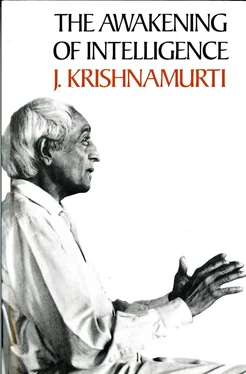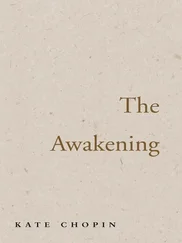Needleman: Yes.
KRISHNAMURTI: And the other fellow says, “I’ll help you” and pushes you off somewhere else.
Needleman: Well, it sort of answers the question. I was reading a book the other day which spoke of something called “Sat-san”.
KRISHNAMURTI: Do you know what it means?
Needleman: Association with the wise.
KRISHNAMURTI: No, with good people.
Needleman: With good people, Ah!
KRISHNAMURTI: Being good you are wise. Not, being wise you are good.
Needleman: I understand that.
KRISHNAMURTI: Because you are good, you are wise.
Needleman: I am not trying to pin this down to something, but I find my students and I myself, speaking for myself, when we read, when we hear you, we say, “Ah! I need no one, I need to be with no one”—and there is a tremendous deception in this too.
KRISHNAMURTI: Naturally, because you are being influenced by the speaker.
Needleman: Yes. That is true. ( Laughter .)
KRISHNAMURTI: Sir, look, let’s be very simple. Suppose, if there were no book, no guru, no teacher, what would you do? One is in turmoil, confusion, agony, what would you do? With nobody to help you, no drugs, no tranquillisers, no organised religions, what would you do?
Needleman: I can’t imagine what I would do.
KRISHNAMURTI: That’s it.
Needleman: Perhaps there would be a moment of urgency there.
KRISHNAMURTI: That’s it. We haven’t the urgency because we say, “Well, somebody is going to help me.”
Needleman: But most people would be driven insane by that situation.
KRISHNAMURTI: I am not sure, Sir.
Needleman: I’m not sure either.
KRISHNAMURTI: No, I am not at all sure. Because what have we done up to now? The people on whom we have relied, the religions, the churches, education, they have led us to this awful mess. We aren’t free of sorrow, we aren’t free of our beastliness, our ugliness, our vanities.
Needleman: Can one say that of all of them? There are differences. For every thousand deceivers there is one Buddha.
KRISHNAMURTI: But that is not my concern, Sir, if we say that it leads to such deception. No, no.
Needleman: Then let me ask you this. We know that without hard work the body may get ill, and this hard work is what we call effort. Is there another effort for what we might call the spirit? You speak against effort, but does not the growth and well-being of all sides of man demand something like hard work of one sort or another?
KRISHNAMURTI: I wonder what you mean by hard work? Physical hard work?
Needleman: That is what we usually mean by hard work. Or going against desires.
KRISHNAMURTI: You see, there we are! Our conditioning, our culture, is built around this “going against”. Erecting a wall of resistance. So when we say “hard work”, what do we mean? Laziness? Why have I to make an effort about anything? Why?
Needleman: Because I wish for something.
KRISHNAMURTI: No. Why is there this cult of effort? Why have I to make effort to reach God, enlightenment, truth?
Needleman: There are many possible answers, but I can only answer for myself.
KRISHNAMURTI: It may be just there, only I don’t know how to look.
Needleman: But then there must be an obstacle.
KRISHNAMURTI: How to look! It may be just round the corner, under the flower, it may be anywhere. So first I have to learn to look, not make an effort to look. I must find out what it means to look.
Needleman: Yes, but don’t you admit that there may be a resistance to that looking?
KRISHNAMURTI: Then don’t bother to look! If somebody comes along and says, “I don’t want to look”, how are you going to force him to look?
Needleman: No. I am speaking about myself now. I want to look.
KRISHNAMURTI: If you want to look, what do you mean by looking? You must find out what it means to look before you make an effort to look. Right, Sir?
Needleman: That would be, to me, an effort.
KRISHNAMURTI: No.
Needleman: To do it in that delicate, subtle way. I wish to look, but I don’t wish to find out what it means to look. I agree this is much more to me the basic thing. But this wish to do it quickly, to get it over, is this not resistance?
KRISHNAMURTI: Quick medicine to get it over.
Needleman: Is there something in me that I have to study, that resists this subtle, much more delicate thing you are speaking about? Is this not work, what you are saying? Isn’t it work to ask the question so quietly, so subtly? It seems to me it is work to not listen to that part that wants to do it . . .
KRISHNAMURTI: Quickly.
Needleman: For us particularly in the West, or maybe for all men.
KRISHNAMURTI: I am afraid it is all over the world the same. “Tell me how to get there quickly.”
Needleman: And yet you say it is in a moment.
KRISHNAMURTI: It is, obviously.
Needleman: Yes, I understand.
KRISHNAMURTI: Sir, what is effort? To get out of bed in the morning, when you don’t want to get up, is an effort. What brings on that laziness? Lack of sleep, over-eating, over-indulging and all the rest of it; and next morning you say, “Oh, what a bore, I have to get up!” Now wait a minute, Sir, follow it. What is laziness? Is it physical laziness, or is thought itself lazy?
Needleman: That I don’t understand. I need another word. “Thought is lazy?” I find that thought is always the same.
KRISHNAMURTI: No Sir. I am lazy, I don’t want to get up and so I force myself to get up. In that is so-called effort.
Needleman: Yes.
KRISHNAMURTI: I want that, but I shouldn’t have it, I resist it. The resistance is effort. I get angry and I mustn’t be angry: resistance, effort. What has made me lazy?
Needleman: The thought that I ought to be getting up.
KRISHNAMURTI: That’s it.
Needleman: All right.
KRISHNAMURTI: So I really have to go into this whole question of thought. Not make out that the body is lazy, force the body out of bed, because the body has its own intelligence, it knows when it is tired and should rest. This morning I was tired; I had prepared the mat and everything to do yoga exercises and the body said “No, sorry”. And I said, “All right”. That is not laziness. The body said, “Leave me alone because you talked yesterday, you saw many people, you are tired.” Thought then says, “You must get up and do the exercises because it is good for you, you have done it every day, it has become a habit, don’t relax, you will get lazy, keep at it.” Which means: thought is making me lazy, not the body is making me lazy.
Needleman: I understand that. So there is an effort with regard to thought.
KRISHNAMURTI: So no effort! Why is thought so mechanical? And is all thought mechanical?
Needleman: Yes, all right, one puts that question.
KRISHNAMURTI: Isn’t it?
Needleman: I can’t say that I have verified that.
KRISHNAMURTI: But we can, Sir. That is fairly simple to see. Isn’t all thought mechanical? The non-mechanical state is the absence of thought; not the neglect of thought but the absence of it.
Needleman: How can I find that out?
KRISHNAMURTI: Do it now, it is simple enough. You can do it now if you wish to. Thought is mechanical.
Needleman: Let’s assume that.
KRISHNAMURTI: Not assume. Don’t assume anything.
Needleman: All right.
KRISHNAMURTI: Thought is mechanical, isn’t it?—because it is repetitive, conforming, comparing.
Читать дальше












